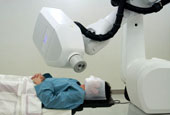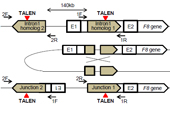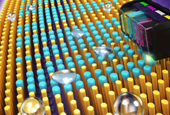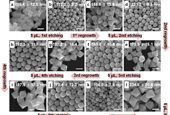Korean and Singaporean researchers developed a new way to treat liver cancer using nanoparticle technology.
The nanoparticle research taskforce at the Institute for Basic Science (IBS) and scientists at the National Cancer Centre Singapore jointly developed a targeted therapeutic method to attack only the liver cancer cells by applying nanoparticle technology to triptolides, announced the Ministry of Science, ICT and Future Planning (MISP) on August 22.
Researchers discovered that triptolides, a natural product found in seaweed mustard is much more effective in liver cancer therapy than existing standards, such as Sorafenib. Hepatocellular carcinomas (HCC) have one of the worst prognoses for survival, as the cancer is poorly responsive to various existing therapies. However, the potential clinical applications of triptolides are also limited due to its high toxicity, which negatively affects healthy tissue.
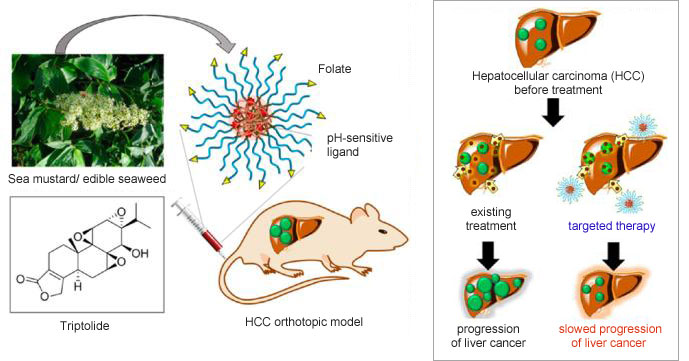
Researchers considered the fact that cancer tissues are more acidic than healthy tissues. They developed pH-sensitive polymers that pop up only when they encounter more acidic cancer tissues, but which stay unchanged when they meet pH-neutral tissue. The polymers then coat the pH-sensitive nanoformulated triptolides with folates, which are selectively bonded with receptors located on the surface of the liver cancer cells. As a result, nanoformulated triptolides can facilitate the uptake specifically into tumor cells, further increasing the efficacy of the therapy while mitigating toxicity of healthy tissues.
"We were able to minimize the negative side effects and to selectively attack only the cancer tissues," said a researcher on the task force. "In our results, the chance of survival of liver-cancer induced mice tripled after nanoformulated triptolides were injected."
The research results were published online on August 5 in ACS Nano, a nano material journal issued by the American Chemical Society.
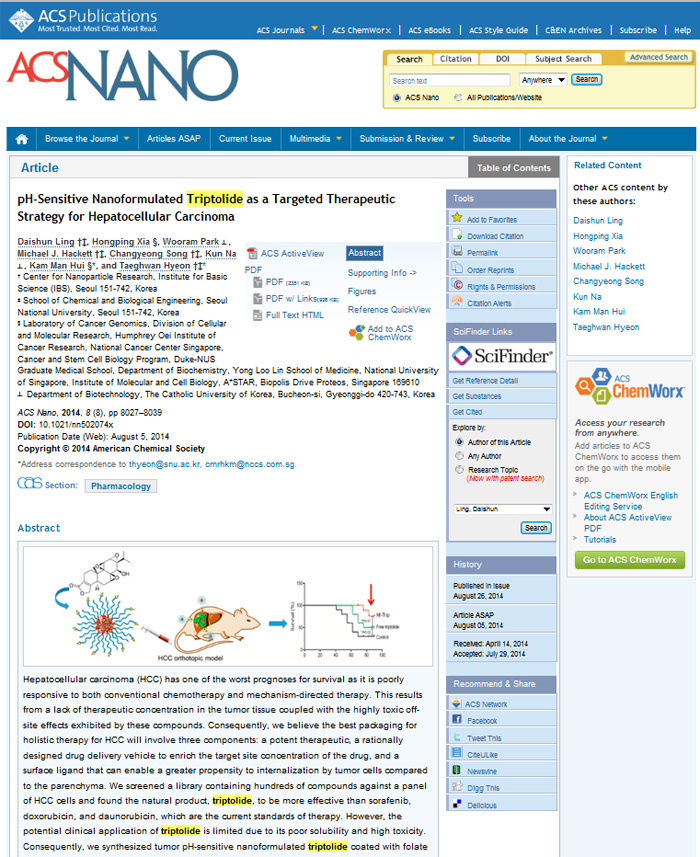
By Limb Jae-un
Korea.net Staff Writer
jun2@korea.kr

The nanoparticle research taskforce at the Institute for Basic Science (IBS) and scientists at the National Cancer Centre Singapore jointly developed a targeted therapeutic method to attack only the liver cancer cells by applying nanoparticle technology to triptolides, announced the Ministry of Science, ICT and Future Planning (MISP) on August 22.
Researchers discovered that triptolides, a natural product found in seaweed mustard is much more effective in liver cancer therapy than existing standards, such as Sorafenib. Hepatocellular carcinomas (HCC) have one of the worst prognoses for survival, as the cancer is poorly responsive to various existing therapies. However, the potential clinical applications of triptolides are also limited due to its high toxicity, which negatively affects healthy tissue.

Triptolides can be injected into nanoparticles as part of the liver cancer therapy process. (photo courtesy of the MISP)
Researchers considered the fact that cancer tissues are more acidic than healthy tissues. They developed pH-sensitive polymers that pop up only when they encounter more acidic cancer tissues, but which stay unchanged when they meet pH-neutral tissue. The polymers then coat the pH-sensitive nanoformulated triptolides with folates, which are selectively bonded with receptors located on the surface of the liver cancer cells. As a result, nanoformulated triptolides can facilitate the uptake specifically into tumor cells, further increasing the efficacy of the therapy while mitigating toxicity of healthy tissues.
"We were able to minimize the negative side effects and to selectively attack only the cancer tissues," said a researcher on the task force. "In our results, the chance of survival of liver-cancer induced mice tripled after nanoformulated triptolides were injected."
The research results were published online on August 5 in ACS Nano, a nano material journal issued by the American Chemical Society.

Research results on pH-sensitive nanoformulated triptolides introduce a new targeted therapy for liver cancer. They were published online in ACS Nano.
By Limb Jae-un
Korea.net Staff Writer
jun2@korea.kr
